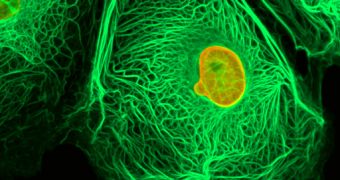Ovarian cancer is one of the main causes for women's deaths across the United States, with an estimated 15,000 of them losing their lives yearly. Because the disease is so hard to diagnose in its early stages, survival rates revolve around 33.5 months. But now, researchers may have found a novel therapy that could increase life expectancy to more than 50 months.
Cancer experts have known for a long time that the PEA-15 protein plays a crucial role in fighting cell mutations, mainly by forcing tumors to feed on themselves, instead of on surrounding tissue. This process, called authopagy – derived from Latin, it means to eat one's self – is the exact opposite of apoptosis, a process in the programmed cell death category. Apoptosis causes the cells to shut down after a period of time, or when certain conditions are present.
"These findings provide a foundation for developing a PEA-15 targeted approach for ovarian cancer and for clarifying whether this protein is a novel biomarker that can predict patient outcomes," said Naoto T. Ueno, M.D., PhD, the senior author of the study, and an associate professor of breast medical oncology at the University of Texas M. D. Anderson Cancer Center.
"PEA-15 offers us a new dimension for potentially targeting ERK. We've shown with high levels of PEA-15, women with ovarian cancer are surviving longer," the scientist added. ERK is a protein, extracellular signaling related kinase, that plays a significant part in essential cell processes, such as growth, differentiation and mobility. If these features are inhibited, then the cells will have nothing else to do than eat themselves up.
The effects of PEA-15 are also being studied in relation to breast cancer, as researchers believe that the protein could be modified to counteract those mutations as well. If they are successful, future therapies, for all kind of cancers, could revolve around this effective protein. The results of the current studies were published November 15th, in Cancer Research.

 14 DAY TRIAL //
14 DAY TRIAL //